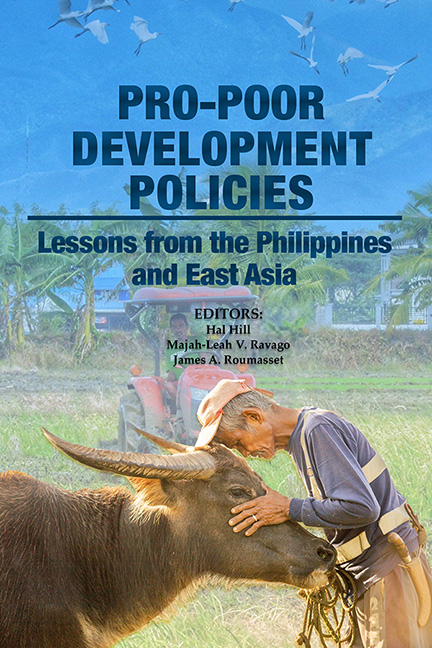Book contents
- Frontmatter
- Dedication
- Contents
- Figures, Tables and Boxes
- Foreword
- Foreword
- Message
- Preface and Acknowledgements
- About the Editors
- About the Contributors
- Acronyms
- Part 1 Introduction and Synthesis
- Part 2 Agricultural and Economic Development
- Part 3 Economic Policies for Achieving Targeted Levels of Living in the Philippines
- Part 4 Inequality and Economic Development
- Part 5 Competition Law and Policy
- Part 6 International Dimensions
- Index
20 - Buyer Power and Late Payment Behaviour in the Shoe Capital of the Philippines
Published online by Cambridge University Press: 09 January 2024
- Frontmatter
- Dedication
- Contents
- Figures, Tables and Boxes
- Foreword
- Foreword
- Message
- Preface and Acknowledgements
- About the Editors
- About the Contributors
- Acronyms
- Part 1 Introduction and Synthesis
- Part 2 Agricultural and Economic Development
- Part 3 Economic Policies for Achieving Targeted Levels of Living in the Philippines
- Part 4 Inequality and Economic Development
- Part 5 Competition Law and Policy
- Part 6 International Dimensions
- Index
Summary
INTRODUCTION
Many developing countries have adopted competition law in the recent few decades. There are more than 130 competition law regimes in the world today (Cheng 2020). Competition agencies in developing countries tend to emphasize that their competition policies aim at contributing to economic development and social inclusion (Evenett 2005). For example, Arsenio M. Balisacan, the first chairperson of the Philippine Competition Commission (PCC), stresses that “the PCC, a young competition agency, has to quickly develop its enforcement capacity, in light of expectations for enforcement to contribute to sustaining rapid economic development and achieving inclusive development” (Balisacan 2020, 13).
The competition agencies of Korea and Japan have traditionally acted against late payment by large firms to small and medium enterprises (SMEs) in retailing and wholesaling, as well as subcontracting. In 2011, the European Commission (EC) strengthened its Late Payment Directive by including a provision that if firms do not pay their invoices within 60 days, they will be forced to pay interest and reimburse the reasonable recovery costs of the creditor. The policy was adopted because a number of SMEs have gone bankrupt each year while waiting for their invoices to be paid and because late payment deprives jobs and stifles entrepreneurship (European Commission 2011). The government of the United Kingdom has been intensifying its efforts to bring about a culture change in payment practice. Few studies have been conducted on payment practices in the developing world, however, and the competition agencies and governments in these countries seem not to be determined to combat late payment to enhance inclusive development.
This chapter presents the case of late payment practices in the shoe industry in the Philippines circa 2000, using interview materials and survey data of shoemakers. In those days, shoemakers did not have the option of using digital platforms to sell goods directly to customers; their direct buyers were retailers and wholesalers. Although none of these buyers dominated the entire domestic market for shoes, it seems that they had buyer power, allowing some of them to delay payment to shoemakers for an extended period, which could be more than a year.
- Type
- Chapter
- Information
- Pro-poor Development PoliciesLessons from the Philippines and East Asia, pp. 574 - 594Publisher: ISEAS–Yusof Ishak InstitutePrint publication year: 2022

